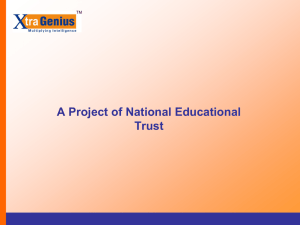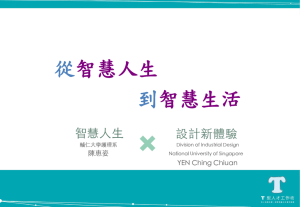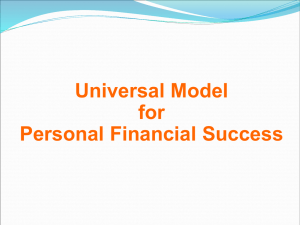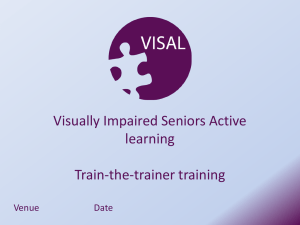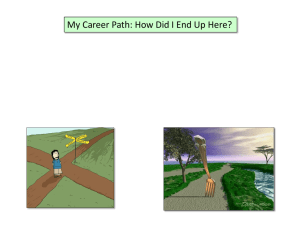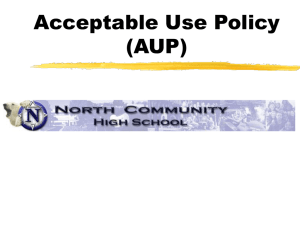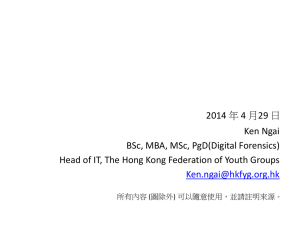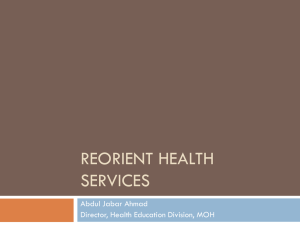INTERNET SAFETY:Workshop
advertisement
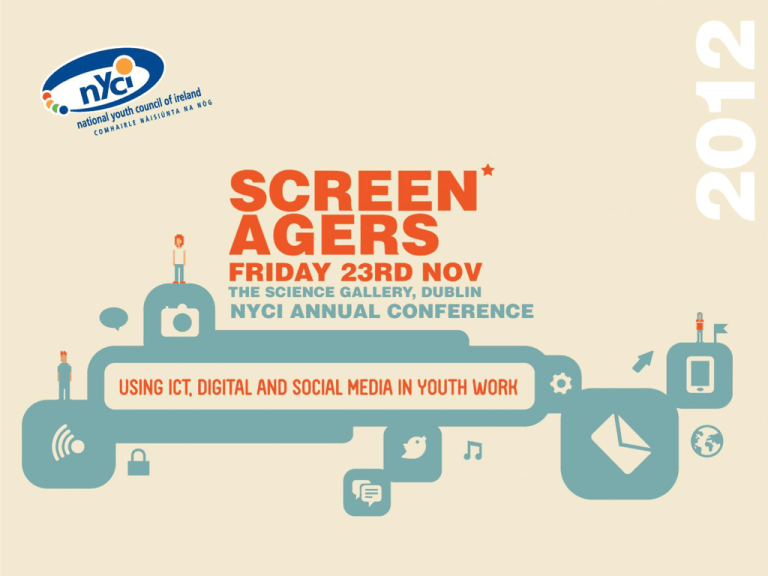
INTERNET SAFETY: Workshop Introduction • • • • Young people have grown up on-line Technology plays a very a significant role in yp’s lives Technologies are constantly changing Move from passive users to active creators of content This results in risks as well as opportunities Youth Work Settings – need to consider our role in managing these risks through educating and empowering young people and in our responsibilities to operate safe practice in our yw settings Workshop Objectives • To explore how young people engage on line • To become aware of potential risks • Discuss to address these risks • To explore resources available • Q&A Webwise - About Us Professional Development Service for Teachers – Technology in Education •Agency of Department of Education and Skills •Co-funded by the EU Safer Internet Programme •Irish member of Insafe Network •Safer Internet Ireland Consortium Internet embedded in daily life, users are getting younger 53% use every day or almost daily, 89% use at least weekly Girls 61 Boys 61 9-10 yrs 61 minutes spent online in an average day (see graph) 45 11-12 yrs 53 13-14 yrs 65 15-16 yrs 80 Age matters for daily use: Low SES 68 33% 9-10 yrs vs. 73% 15-16 yrs Children first go online at 9 yrs old: at 7 for 9-10 yrs, at 11 for 15-16 yrs Medium SES 57 High SES 58 All children 61 0 20 40 60 Minutes per day online 80 100 Mobile access growing % Handheld device 23% via handheld devices % Mobile phone but no other handheld device Girls 52% via mobile and/or handheld device 24 Boys 22 9-10 yrs Flexible access is growing 11-12 yrs 18 17 31 23 15-16 yrs 32 38 Low SES In the top league of European countries for mobile access 29 13 13-14 yrs Age and SES matter 29 18 Medium SES 38 23 High SES 27 28 All children 22 23 0 35 29 20 40 60 80 100 Uneven digital skills 8 7 6 5,8 5,4 5,3 5,1 5,0 5,0 5,0 4,9 5 4,8 4,7 4,7 4,7 4,7 4,6 4,5 4,5 4,4 4,2 4,0 4,2 3,8 3,7 4 3,4 3,4 3,3 2,6 3 2 1 0 FI SI NL EE CZ SE NO PT LT AT UK BG FR DK PL ES BE DE IE CY EL HU RO IT TR ALL Multiple opportunities Watching video clips and playing games are the most popular activities % Experienced one or more risk factor More opportunities, more risks 70 Average for all children EE NO SE 60 DK FI 50 AT DE IE TR PL ES IT EL CZ SI NL RO 40 LT BG BE FR UK HU CY PT 30 5 6 7 8 Average number of online activities 9 Bullied in Last Year •Nearly one in four (23%) 9-16 year olds in Ireland say that someone has acted in a hurtful or nasty way towards them in the past 12 months. This is higher than the figure of one in five or 19% reported for Europe as a whole. •Younger children, 9-10 year olds, claim to be bullied the most (28%), well above the European average of 17%. Bullied Other •14% have also bullied others in the past twelve months. •Bullying others is more common among 15-16 year olds (24%) and among boys (19%). Risks • Sharing – digital footprint, easily traced, information can become public • Friending – easy to lie, request from strangers, blocking • Chatting –not chatting to ‘strangers’, revealing personal information • Playing – addiction, bullying, contact with adults, commercial pressures Risks • Pornography – increasingly accessible • Sexting – sending an inappropriate text or image to other people • Unhealthy networking – ie. websites encouraging unhealthy behaviour Child Abuse • • • • The internet has not created child abuse but has facilitated; Networking Exchange, distribution, collection, and creation of indecent images Direct contact with children and grooming New forms of ‘non contact’ sexual abuse Internet Safety Strategy • Technical Solutions • Acceptable Use Policies • Education and Awareness Raising Technical Solutions • • • • Virus Control Spam Filtering Content Firewalls AUP’s & Other Policies What? - An Acceptable Use Policy (AUP) is a document, signed by young people and their parents, guardians or carers, detailing the ways in which the Internet, mobile phones and related devices can and cannot be used in your youth service. AUP’s & Other Policies Why? - An agreed policy approach promotes good practice and safe, responsible use of the internet. While the web can be a great learning tool, it also contains some dangerous content and can be abused. That’s why it’s vital that youth services establish an AUP which addresses all rights, privileges, responsibilities and sanctions associated with computer use. It also provides a service with legal protection from liability. AUP’s & Other Policies How? http://www.webwise.ie/WebwiseAUPGuidelines.pdf Education and Awareness • Young People • Youth Work Staff and Volunteers • Parents Tips for Young People • Nothing is private on the internet. • Don’t share personal or revealing information i.e. passwords/phone number/address. • Don’t believe everyone is who they say they are. • Remember whatever goes on line can be viewed forever. • Know your rights and responsibilities when using the internet. • Do not open emails from people you don’t know. • Keep your anti-virus software up to date. Tips for Young People • Ignore requests for meeting someone on your own. • Don’t send someone a photo of yourself particularly if they ask for a revealing or undressed photo of you. • Tell someone if you are concerned about anything. • If you feel something is not right then it probably isn’t. • Find out what the youth organisation’s AUP is so that you know how to behave online Tips for Staff & Volunteers Supervision • Supervise yp’s online activity in accordance with your organisation’s policy. • Know what level of monitoring you can utilise and inform the young people and their parents/guardians how you are monitoring their usage. • It is not advisable to use personal social networking profiles to connect with the young people online or as a way of supervising their activity. Tips for Staff & Volunteers Empowering – Involve young people in writing a code for the acceptable use of the internet. – Educate young people on safe use of on line activities, safety and security settings, managing profiles. – Inform and encourage young people on how to report any concerns Tips for Staff & Volunteers Personal Use • Do not accept friend requests from young people • Do not engage in on line communication in a personal capacity • Consider what you post on line and who has access to it Resources - SpunOut Demonstration of on-line engagement with young people and resources available to young people and youth services Resources www.webwise.ie www.spunout.ie www.youthworkireland.ie www.barnardos.ie www.hotline.ie www.childline.ie NYCI - websafety.youth.ie (under construction) Thank You Olive Ring NYCI olive@nyci.ie Simon Grehan Webwise sgrehan@pdst.ie Ian Power SpunOut ian@spunout.ie


